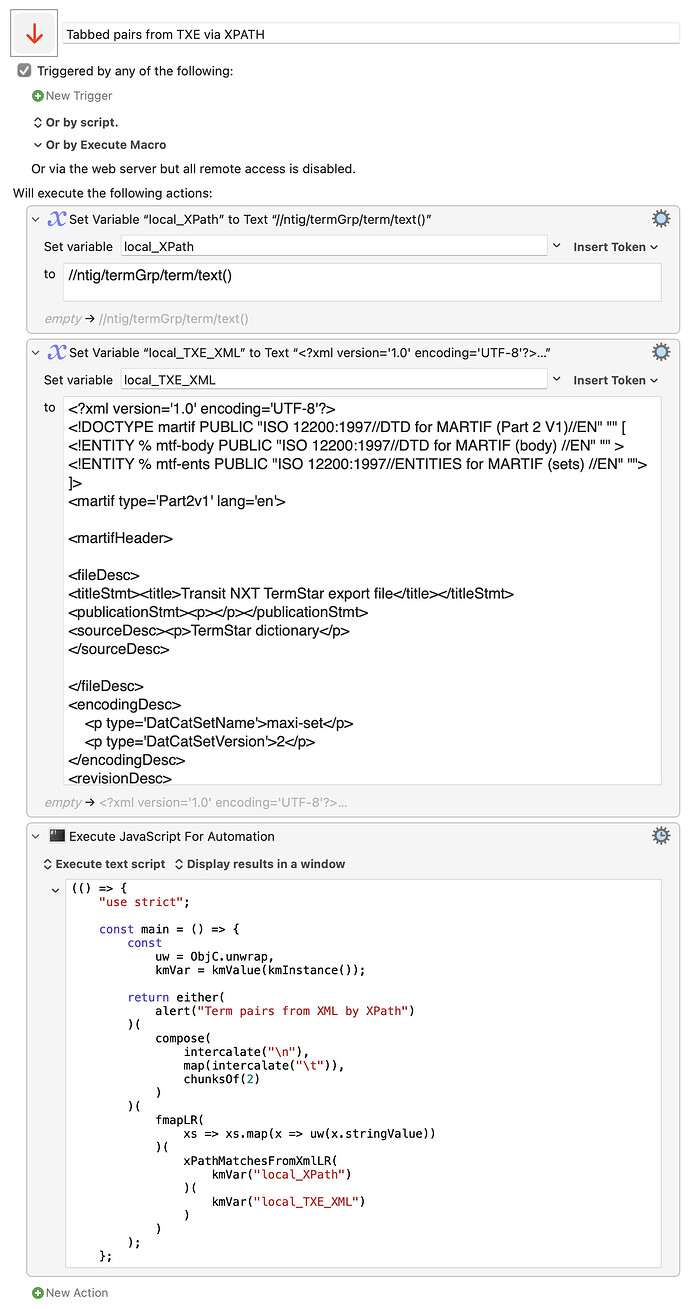For simple cases of fetching data like this, without much further processing, XQuery may be more than you need, and the XPath expression alone is probably enough:
//ntig/termGrp/term/text()
It just requires a slightly different calling function in the JXA:
Tabbed pairs from TXE via XPATH.kmmacros (15 KB)
Expand disclosure triangle to view JS source
(() => {
"use strict";
const main = () => {
const
uw = ObjC.unwrap,
kmVar = kmValue(kmInstance());
return either(
alert("Term pairs from XML by XPath")
)(
compose(
intercalate("\n"),
map(intercalate("\t")),
chunksOf(2)
)
)(
fmapLR(
xs => xs.map(x => uw(x.stringValue))
)(
xPathMatchesFromXmlLR(
kmVar("local_XPath")
)(
kmVar("local_TXE_XML")
)
)
);
};
// ---------------- KEYBOARD MAESTRO -----------------
// kmValue :: KM Instance -> String -> IO String
const kmValue = instance =>
k => Application("Keyboard Maestro Engine")
.getvariable(k, {instance});
// kmInstance :: () -> IO String
const kmInstance = () =>
ObjC.unwrap(
$.NSProcessInfo.processInfo.environment
.objectForKey("KMINSTANCE")
) || "";
// --------------------- XPATH ----------------------
// xPathMatchesFromXmlLR :: String ->
// String -> Either String [NSXMLElement]
const xPathMatchesFromXmlLR = xpath =>
xml => {
const
uw = ObjC.unwrap,
error = $(),
xmlDoc = $.NSXMLDocument.alloc
.initWithXMLStringOptionsError(
xml, 0, error
);
return bindLR(
xmlDoc.isNil()
? Left(uw(error.localizedDescription))
: Right(xmlDoc)
)(doc => {
const
e = $(),
matches = (
doc.documentContentKind = (
$.NSXMLDocumentXMLKind
),
doc.nodesForXPathError(
xpath, e
)
);
return matches.isNil()
? Left(uw(e.localizedDescription))
: Right(uw(matches));
});
};
// ----------------------- JXA -----------------------
// alert :: String => String -> IO String
const alert = title =>
s => {
const sa = Object.assign(
Application("System Events"), {
includeStandardAdditions: true
});
return (
sa.activate(),
sa.displayDialog(s, {
withTitle: title,
buttons: ["OK"],
defaultButton: "OK"
}),
s
);
};
// --------------------- GENERIC ---------------------
// Left :: a -> Either a b
const Left = x => ({
type: "Either",
Left: x
});
// Right :: b -> Either a b
const Right = x => ({
type: "Either",
Right: x
});
// bindLR (>>=) :: Either a ->
// (a -> Either b) -> Either b
const bindLR = m =>
mf => m.Left ? (
m
) : mf(m.Right);
// chunksOf :: Int -> [a] -> [[a]]
const chunksOf = n => {
// xs split into sublists of length n.
// The last sublist will be short if n
// does not evenly divide the length of xs .
const go = xs => {
const chunk = xs.slice(0, n);
return 0 < chunk.length
? [chunk, ...go(xs.slice(n))]
: [];
};
return go;
};
// compose (<<<) :: (b -> c) -> (a -> b) -> a -> c
const compose = (...fs) =>
// A function defined by the right-to-left
// composition of all the functions in fs.
fs.reduce(
(f, g) => x => f(g(x)),
x => x
);
// either :: (a -> c) -> (b -> c) -> Either a b -> c
const either = fl =>
// Application of the function fl to the
// contents of any Left value in e, or
// the application of fr to its Right value.
fr => e => e.Left ? (
fl(e.Left)
) : fr(e.Right);
// fmapLR (<$>) :: (b -> c) -> Either a b -> Either a c
const fmapLR = f =>
// Either f mapped into the contents of any Right
// value in e, or e unchanged if is a Left value.
e => "Left" in e ? (
e
) : Right(f(e.Right));
// intercalate :: String -> [String] -> String
const intercalate = s =>
// The concatenation of xs
// interspersed with copies of s.
xs => xs.join(s);
// map :: (a -> b) -> [a] -> [b]
const map = f =>
// The list obtained by applying f
// to each element of xs.
// (The image of xs under f).
xs => [...xs].map(f);
return main();
})();
